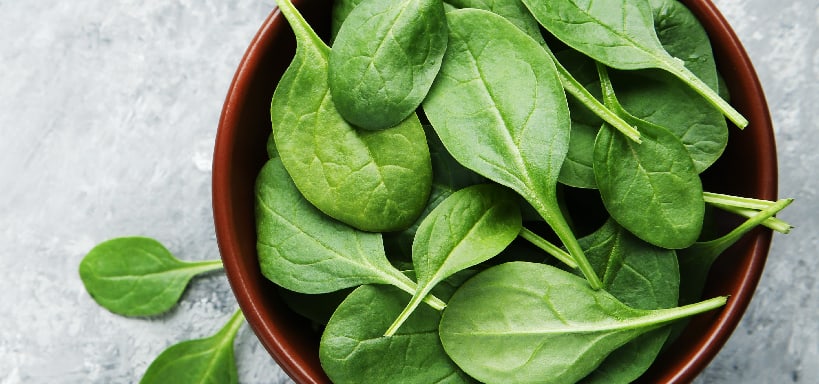Top 25+ Vitamin K Foods & Their Many Health Benefits-by Rachael Link, MS, RD
Ready for yet another reason to eat your veggies? Foods like leafy greens and veggies, including broccoli and cabbage, are loaded with vitamin K, an important nutrient that’s been associated with improved insulin levels, a reduced risk of cancer and protection against heart disease. Not only that, but vitamin K foods can also promote proper blood clot formation and support bone health.
Oh yes, they also help keep vitamin K deficiency at bay.
This essential micronutrient isn’t just found in greens, though. It can also be found in certain types of fruit, meat and dairy, and it is even produced inside your own body by your good gut bacteria.
Getting a good amount of vitamin K from dietary sources is integral to health, and a deficiency can result in a long list of health problems.
Keep reading to find out what you need to know about vitamin K foods and how you can ensure that you get enough in your diet.
What Is Vitamin K?
Vitamin K is an important nutrient that plays a role in everything from bone metabolism to blood sugar control. It’s broken down into two main types: vitamin K1 (phylloquinone) and vitamin K2 (menaquinone).
Vitamin K1 is the most common source that is present primarily in plant foods like leafy greens. Vitamin K2, on the other hand, is found in animal products and fermented foods.
Foods high in this vitamin include meat, dairy and natto. It is also produced by the beneficial bacteria in your gut microbiome.
On a healthy, well-balanced diet, a deficiency of vitamin K is rare. This is because it’s plentiful in healthy whole foods.
Ultra-processed foods and refined sugars, on the other hand, are foods with a minimal amounts of vitamin K. If these nutrient-poor foods make up a large part of your diet, it could mean you may not get enough dietary sources of this key vitamin.
Vitamin K deficiency is very serious and can result in easy bruising, bleeding, tooth decay and issues with bone health. For this reason, it’s crucial to ensure you’re including a serving or two of vitamin K-rich foods with each meal.
Types
Many people don’t realize that there is more than one type of vitamin K. There are actually two main forms of vitamin K that we acquire from our diets, as previously mentioned: vitamin K1 and vitamin K2.
Vitamin K1 is also called phytonadione, while vitamin K2 is referred to as menaquinone. Vitamin K3 is also available, which is a synthetic form known as menadione.
Here’s a breakdown of the different types of vitamin K and how to get them from vitamin K foods or dietary supplements:
Vitamin K1 is mostly found in vegetables, while vitamin K2 is found in fermented dairy products and is also produced by the bacteria in our guts.
While vitamin K1 is found in plant foods that are very healthy for many reasons — such as leafy greens like spinach, kale, broccoli and cabbage — it’s vitamin K2 that seems to be most beneficial for protecting the heart.
In fact, vitamin K2 seems to be more effective than vitamin K1 at preventing and reversing arterial calcifications that lead to heart-related problems.
The best way to get the daily requirement of both types is by eating a variety of whole vitamin K foods, including green plant foods and raw, fermented dairy products (like yogurt or raw cheese), fish and eggs that provide vitamin K2.
Additionally, there is a synthetic version known as vitamin K3. However, it’s best to eat plenty of whole foods that are high in vitamin K and other important nutrients instead of relying on dietary supplements.
Top Vitamin K Foods
Looking for a list of food options that contain vitamin K? This essential vitamin is found primarily in green vegetables, fruits, probiotic foods and animal products, which makes it easy to meet your needs through a healthy and well-balanced diet.
Here are some of the top vitamin K foods:
Kale — ½ cup cooked: 531 micrograms (over 100 percent DV)
Spinach — ½ cup cooked: 445 micrograms (over 100 percent DV)
Collard greens — 1/2 cup cooked: 386 micrograms (over 100 percent DV)
Beet greens — 1/2 cup cooked: 348 micrograms (over 100 percent DV)
Turnip greens — ½ cup cooked: 265 micrograms (over 100 percent DV)
Dandelion greens — ½ cup raw: 214 micrograms (over 100 percent DV)
Mustard greens — ½ cup cooked: 210 micrograms (over 100 percent DV)
Swiss chard — ½ cup raw: 150 micrograms (over 100 percent DV)
Brussels sprouts — ½ cup cooked: 109 micrograms (91 percent DV)
Spring onions (scallions) — ½ cup raw: 103 micrograms (86 percent DV)
Cabbage — ½ cup cooked: 81.5 micrograms (68 percent DV)
Beef liver — 1 slice — 72 micrograms (60 percent DV)
Kiwi — 1 cup — 71 micrograms (59 percent DV)
Celery juice: 69.1 micrograms (57% DV)
Chicken breast — 3 ounces cooked — 51 micrograms (43 percent DV)
Broccoli — ½ cup raw: 46 micrograms (38 percent DV)
Avocado — 1 cup — 31.5 micrograms (26 percent DV)
Green beans — 1/2 cup cooked: 30 micrograms (25 percent DV)
Blackberries — 1 cup — 29 micrograms (24 percent DV)
Blueberries — 1 cup — 29 micrograms (24 percent DV)
Natto — 3.5 ounces — 23 micrograms (19 percent DV)
Green peas — 1/2 cup cooked: 21 micrograms (17 percent DV)
Prunes — 1 ounce — 17 micrograms (14 percent DV)
Soft cheese — 1 ounce — 17 micrograms (14 percent DV)
Parsley — 1 fresh sprig: 16 micrograms (13 percent DV)
Other vitamin K foods include:
pork chops (though pork can be problematic)
goose liver paste
soybean oil
hard cheeses
bacon
ground beef
pork liver
duck breast
beef kidneys
chicken liver
whole milk
butter
pomegranate
figs
tomatoes
grapes
red currants
soybeans
sprouted mung beans
cashews
red kidney beans
hazelnuts
pine nuts
pecans
walnuts
and more
Benefits
1. Fight cancer
Some evidence has found that vitamin K1 and vitamin K2 could help kill off cancer cells and may even reduce the risk of cancer.
One study from the Department of Medicine, Division of General Internal Medicine at the University of Toronto evaluated 440 postmenopausal women with weakened bones who were supplemented with vitamin K1 for two years. Interestingly enough, taking vitamin K1 was associated with a 75 percent reduction in cancer incidence.
Another study published in the American Journal of Clinical Nutrition comprising 24,340 participants showed that a higher intake of vitamin K2 was associated with a reduced risk of cancer.
Furthermore, many foods high in vitamin K also make the list of top antioxidant foods as well. Vitamin K foods like leafy greens are jam-packed with cancer-fighting antioxidants, which help prevent damage from free radicals and decrease the risk of cancer — making these ingredients some of the best cancer-fighting foods.
2. Build strong bones
Getting enough vitamin K1 foods in your diet is key to maintaining bone health. The nutrient is involved in bone metabolism and increases the amount of a specific protein that is required to maintain the calcium in your bones.
Several studies have found that increasing your intake of this important fat-soluble vitamin can help reduce the risk of bone fractures. A 2020 study found that there’s a synergistic effect of vitamin K combined with vitamin D, with beneficial effects for joint and bone health.
A study published in the journal PLoS Medicine concluded that taking 5 milligrams of a vitamin K1 dietary supplement for two to four years was able to protect postmenopausal women against fractures.
Another study out of the Jean Mayer U.S. Department of Agriculture Human Nutrition Research Center on Aging at Tufts University in Boston demonstrated that a low intake of vitamin K foods was associated with reduced bone mineral density in women.
For this reason, many women at risk for osteoporosis often use supplementation to ensure that they are meeting their needs. Other natural treatments for osteoporosis include weight training a few times per week, getting daily sun exposure and eating plenty of foods rich in omega-3 fatty acids.
3. Ensure healthy blood clotting
Perhaps the most well-known vitamin K function is its role in promoting the formation of blood clots.
Blood clotting is an important process that helps stop excess bleeding as a result of injury. In fact, one of the first warning signs of a vitamin K deficiency is bleeding from the gums or nose along with easy bruising.
Because of this, those on blood thinners like warfarin (Coumadin) are recommended to moderate their intake of this key vitamin.
Warfarin (Coumadin) works against vitamin K to help slow coagulation in the blood. Dramatic increases or decreases in your daily intake can interfere with and lower the effects of these medications.
4. Promote heart health
Besides ensuring healthy blood clotting, eating plenty of foods high in vitamin K may improve your heart function in other ways as well.
In a 2009 study published in the American Journal of Clinical Nutrition with 388 participants, vitamin K1 was found to slow the progression of coronary artery calcification in older adults.
Other studies have also confirmed the beneficial effects of vitamin K1 on vascular calcification, a condition in which calcium deposits build up in the arteries and cause blood vessels to lose elasticity.
Coronary calcification is believed to be a strong predictor of coronary heart disease. Increasing your intake of vitamin K foods can help prevent its progression to keep your heart healthy and strong.
5. Improve insulin sensitivity
Insulin is the hormone responsible for transporting sugar from the bloodstream to the tissues, where it can be used as energy.
When you have a diet high in sugar and carbohydrate foods, your body tries to produce more and more insulin to keep up. Unfortunately, sustaining high levels of insulin can lead to a condition called insulin resistance, which decreases its effectiveness and results in high blood sugar.
Upping your intake of vitamin K dietary sources may help with insulin sensitivity to maintain normal blood sugar levels. A study published in the journal Diabetes Care found that 36 months of supplementation helped reduce the progression of insulin resistance in older men.
In addition to including plenty of vitamin K foods in your diet, increasing your physical activity, keeping your carbohydrate food intake under control, and eating plenty of protein- and fiber-rich foods can also help stabilize blood sugar levels and prevent insulin resistance.
6. Boost brain function
Vitamin K plays an important role in the nervous system and is also believed to support healthy brain function. It is involved in the metabolism of sphingolipids, a class of compounds found in brain cell membranes that control motor and cognitive behavior.
It also has anti-inflammatory properties and helps protect the brain against oxidative stress caused by free radical damage. Research suggests that oxidative stress can damage your cells and may even lead to the development of conditions like Alzheimer’s disease and Parkinson’s disease.
Recipes
Ready to start incorporating more vitamin K-rich foods into your diet? Head over to the kitchen and give these delicious recipes a try:
Kale Chips
Crockpot Beef and Broccoli
Cucumber Salad
Roasted Brussels Sprouts with Apples & Pecans
Stuffed Cabbage Rolls with Lamb
You can also try a recipe with any number of other vitamin K food sources, such as turnip greens, mustard greens, collards and spinach.
Enjoy a leafy green salad, greens cooked with other veggies, a raw spinach salad, kale cooked as a side dish or any other types of dishes that help you reach your daily needs.
Supplements and Dosage
Although this important nutrient is abundant throughout the food supply, it can be found in supplement form as well.
Vitamin K tablets are available and often combined with other vitamins and nutrients, such as calcium, magnesium or vitamin D. Vitamin K is usually present in most multivitamins as well.
Vitamin K supplements commonly use synthetic forms of vitamin K1 or vitamin K2. Studies show that these are well-absorbed in the body, but MK-7, the synthetic form of vitamin K2, has a longer half-life and remains active in the body for longer.
If you do decide to take a vitamin K supplement, the amount you need may vary based on your age and gender. Here are the current established adequate intakes for vitamin K according to the National Institutes of Health:
Infants
0–6 months: 2 micrograms/day
7–12 months: 2.5 micrograms/day
Children
1–3 years: 30 micrograms/day
4–8 years: 55 micrograms/day
9–13 years: 60 micrograms/day
Adolescents and Adults
14–18 years: 75 micrograms/day
19+ years: 120 micrograms/day for males, 90 micrograms/day for females
Risks and Side Effects
Although vitamin K supplements are considered safe for most people, those who are pregnant and breastfeeding should avoid vitamin K dietary supplements that provide an amount higher than the recommended daily allowance.
Additionally, if you have a history of stroke, cardiac arrest or issues with blood clot formation, contact your doctor before taking supplements.
If you are on blood thinners, you should not take a vitamin K dietary supplement and need to moderate your vitamin K intake. Warfarin and vitamin K can interact, causing a decrease in the effectiveness of your medications.
Contact your doctor or dietitian if you have any concerns or need to discuss any foods with vitamin K to avoid while on warfarin.
Adverse symptoms of supplementation are uncommon but can include a decrease in appetite, paleness, muscle stiffness or difficulty breathing. Discontinue use and talk to your doctor immediately if you experience any of these negative symptoms.
Finally, keep in mind that too much vitamin K can also be harmful. For best results, stick to dietary food sources of vitamin K, and use dietary supplementation only as directed to avoid adverse effects on health.
Final Thoughts
What is vitamin K exactly, and what does vitamin K do? It is an important fat-soluble nutrient that plays a central role in many aspects of health.
There are two main types of this important vitamin: Vitamin K1 is commonly found in plant foods as well as leafy greens, while vitamin K2 is in animal products and probiotic foods like meat, dairy foods and natto.
Including a serving of vitamin K foods with each meal can help you easily meet your needs. Dietary supplements are also available to boost intake if needed as well.
The dosage recommendations and daily amounts of vitamin K that are needed can vary based on age and gender.
There are a number of potential vitamin K benefits. In fact, this essential micronutrient has been shown to improve bone strength, protect against heart disease, enhance blood sugar control, fight cancer, boost brain function and ensure healthy blood clot formation.
The post Top 25+ Vitamin K Foods & Their Many Health Benefits appeared first on Dr. Axe.
Nutrition Archive – Dr. Axe




